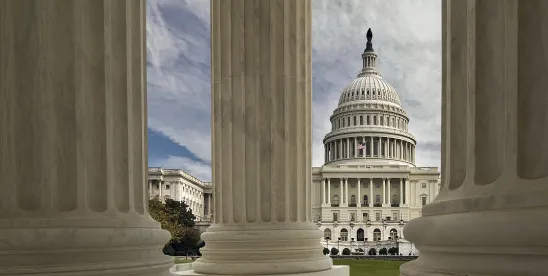THIS WEEK’S DOSE
- Congress returns. Key agenda items this month include extending government funding and expiring healthcare programs beyond the September 30, 2025, fiscal year deadline.
- House Energy and Commerce Health Subcommittee holds hearing on AI. Members examined how artificial intelligence (AI) can be used in healthcare while prioritizing patient privacy.
- HHS Secretary Kennedy testifies at Senate Finance Committee. The US Department of Health and Human Services (HHS) secretary received backlash from both sides of the aisle about recent actions on vaccine policy.
- FDA revokes emergency use authorizations for COVID-19 vaccines. The move by the US Food and Drug Administration (FDA) prompted strong reactions on Capitol Hill.
- CMS expands access to catastrophic health plans through ACA marketplaces. The Centers for Medicare & Medicaid Services (CMS) stated that the change is due to rising premiums in Affordable Care Act (ACA) marketplaces in plan year 2026.
- HHS announces crackdown on health data blocking. The Office of Inspector General issued an enforcement alert, and the Assistant Secretary for Technology Policy/Office of the National Coordinator held a bootcamp to address instances of information blocking.
- Federal court partially blocks ACA enrollment and eligibility rule. The court temporarily stayed six provisions in the June 2025 final rule.
CONGRESS
Congress returns. Government funding runs out on September 30, 2025, and several healthcare programs and flexibilities expire, including Medicare telehealth flexibilities, Medicare disproportionate share funding for safety net hospitals, and community health center funding.
Lawmakers will be working this month to avoid a government shutdown, likely in the form of a temporary continuing resolution (CR), which would give lawmakers additional time to finalize fiscal year (FY) 2026 spending bills. If Congress can agree on a short-term CR, it likely will extend expiring health provisions for the same duration as the CR, pushing the ongoing battle over government funding, health extenders, and any other priorities later into the year. It is not a given that Congress will be able to coalesce around even a short-term, relatively clean CR. If they cannot, a government shutdown is a real possibility.
In the meantime, the House Appropriations Committee continued to move through the regular FY 2026 appropriations process this week, with the Labor-HHS Subcommittee advancing its FY 2026 bill. Funding differences between the House and Senate Labor-HHS bills will need to be reconciled before a final bill can be enacted. The House bill would provide $108 billion for HHS in FY 2026, compared to $117 billion in the Senate bill. President Trump requested $94 billion. The House Appropriations Committee will likely consider the Labor-HHS appropriations bill next week, but expectations for floor action are less certain.
Outside of appropriations, enhanced advanced premium tax credits (APTCs) are set to expire at the end of this calendar year. A Congressional Budget Office (CBO) analysis sent to Congress, but not officially posted on the CBO website, indicates that expiration of the enhanced APTCs would result in a 7.6% increase in gross premiums for benchmark plans in the ACA marketplaces. As insurance commissioners approve rates for plans in their states, some are seeing much larger increases. The National Association of Insurance Commissioners has written to Congress to encourage extension of these tax credits. In response to these projected increases, 11 vulnerable House Republicans and four House Democrats introduced H.R. 5145, the Bipartisan Premium Tax Credit Extension Act, which would extend the credits for one year.
CBO also found that making the enhanced APTCs permanent would, over a 10-year period, cost $348 billion and increase the number of individuals purchasing marketplace coverage by 7.1 million, ultimately decreasing the number of individuals without health insurance by 3.5 million.
House Energy and Commerce Health Subcommittee holds hearing on AI. Members on both sides of the aisle raised concerns about AI’s impact on children’s mental health and asked witnesses how patient privacy can be protected. Witnesses described current uses of AI in healthcare and the potential dangers of unregulated chatbots. Republicans focused predominately on how AI innovation can streamline healthcare, especially in rural hospitals, while Democrats expressed concern that Medicare and Medicaid cuts could prevent patients from benefitting from new innovations.
HHS Secretary Kennedy testifies at Senate Finance Committee. Ahead of the hearing, Senate Finance Committee Democrats called for Secretary Kennedy’s resignation. Sen. Whitehouse (D-RI) was the only Democrat who did not join them. Ranking Member Wyden (D-OR) and Sen. Alsobrooks (D-MD) released a report detailing day-by-day actions under Secretary Kennedy’s leadership. The committee also voted along party lines to advance the nominations of Gustav Chiarello III to be an Assistant Secretary of HHS and Michael Stuart to be General Counsel of HHS.
The hearing was combative, and not entirely on a partisan basis. Secretary Kennedy interrupted and challenged statements from senators on both sides of the aisle, and many senators interrupted him as well. Sens. Barrasso (R-WY) and Cassidy (R-LA) both had especially strong interactions with him regarding vaccines. Many stakeholders anticipated that the administration would release its second MAHA report to give Secretary Kennedy a topic to focus on at the hearing other than vaccines and the recent firing of Centers for Disease Control and Prevention (CDC) Director Monarez after less than a month in the role. HHS did not do so, however.
ADMINISTRATION
FDA revokes emergency use authorizations for COVID-19 vaccines. HHS Secretary Kennedy announced the decision in a post on X, marking a significant shift in COVID-19 vaccine policy. Individuals who are not high risk or elderly now must consult with their doctor if they want to receive the vaccine.
CDC generally adopts Advisory Committee on Immunization Practices (ACIP) recommendations, on which states typically rely. HHS Secretary Kennedy overhauled ACIP a few months ago (currently only seven of the 17 positions are filled), and the committee isn’t scheduled to meet until September 18, 2025.
These decisions coincided with several high-profile departures at the CDC, including the firing of CDC Director Monarez, who released an op-ed on September 4, 2025, about her experience. The turnover has received attention from lawmakers on both sides of the aisle. Senate Health, Education, Labor, and Pensions Chair Cassidy (R-LA) called for the committee to conduct oversight and for ACIP to indefinitely postpone its September meeting. He stated that if the meeting proceeds, “any recommendations made should be rejected as lacking legitimacy given the seriousness of the allegations and the current turmoil in CDC leadership.”
In response, California, Oregon, and Washington announced the launch of a new West Coast Health Alliance that will provide independent vaccine recommendations. The three states will no longer rely on CDC recommendations. The same day, Florida Surgeon General Joseph Ladapo announced that Florida plans to become the first state to end all vaccine mandates, including for school children. Other states also are taking action: Massachusetts mandated vaccine coverage regardless of federal requirements, and New York state legislators are working on a similar plan.
CMS expands access to catastrophic health plans in ACA marketplaces. CMS will expand the hardship exemption that allows consumers to purchase catastrophic health plans in ACA marketplaces. The expansion applies to consumers with incomes above 250% of the federal poverty line (FPL) who are ineligible for cost saving reductions (CSRs). Previously, the exemption was only available to consumers who were newly ineligible for APTCs or CSRs because their income was less than 100% of FPL or more than 400% of FPL. CMS presented this change as a way to expand coverage options through the ACA marketplaces because premiums are forecast to increase significantly as a result of inflation and the pending expiration of enhanced APTCs.
Catastrophic health plans are not eligible for APTCs or CSRs. While catastrophic plans must cover the same essential benefits as other ACA plans, they have deductibles equal to the out-of-pocket limit ($10,600 for an individual and $21,200 for a family in 2026). They only cover three primary care visits per year on a pre-deductible basis but provide coverage for preventive care at no cost sharing, as is required of all ACA plans.
The new application will automatically evaluate hardship eligibility and will begin on November 1, 2025. CMS has implemented a new expedited review process that it states will more easily approve hardship exemption applications.
HHS announces crackdown on health data blocking. HHS announced that investigation units and health IT offices are stepping up enforcement of information blocking committed by providers, health IT developers and health information exchanges. The announcement comes as the department is trying to improve the flow of patient health information by securing voluntary commitments by 60 major health care and tech companies to advance interoperability. ASTP/ONC has already begun to review reports of information blocking and provide technical assistance to HHS’s Office of Inspector General to assist their investigations, Assistant Secretary Thomas Keane said in a statement.
COURTS
Federal court partially blocks ACA enrollment and eligibility rule. In City of Columbus v. Kennedy, a Maryland federal judge granted a nationwide stay of certain provisions in the administration’s ACA enrollment and eligibility rule, stating that they violated the Administrative Procedure Act. The temporarily stayed provisions include:
- $5 premium penalty on auto-reenrollments.
- Disqualification of enrollees due to failure to file and reconcile the previous year.
- Elimination of guaranteed insurance coverage for individuals with past-due premiums.
- Exchange verification of certain household income data.
- Pre-enrollment eligibility checks ahead of a special enrollment period.
- Changes to the formula used to calculate plan tiers.
QUICK HITS
- CBO releases updated analysis. CBO estimates that the One Big Beautiful Bill Act’s changes to the ACA marketplaces will increase the total number of people without health insurance by 2.1 million in 2034 and reduce gross benchmark premiums by 0.6% in 2034. CBO also found that 2.3 million individuals improperly claimed an APTC via intentional overstatement of income for 2025.
- Rural Health Transformation program webpage goes live. The webpage includes a timeline and additional application details for states, and sets forth five strategic goals for the program’s funds.
- CMS Innovation Center announces changes to AHEAD Model. The Achieving Healthcare Efficiency through Accountable Design (AHEAD) Model was rebranded and extended by another year. The CMS Innovation Center also announced the inclusion of geographic attribution and enhanced flexibilities.
- HHS announces nutrition education reform initiative. With the support of the US Department of Education, HHS directed US medical education organizations to submit written plans to integrate nutrition education requirements in several areas. The written plans are due by September 10, 2025, and must detail the scope, timeline, standards alignment, measurable milestones, and accountability measures of the organization’s nutrition education commitments. Read HHS Secretary Kennedy’s op-ed here.
- MedPAC hosts September public meeting. The Medicare Payment Advisory Commission (MedPAC) agenda included sessions on Medicare payment operations and improving payment accuracy, context for Medicare payment policy, access to hospice and certain services under the hospice benefit for beneficiaries with end-stage renal disease or cancer, and the association between changes in Medicare Advantage enrollment and hospital finances. The US Government Accountability Office (GAO) presented on oversight necessary to ensure Medicare’s sustainability.
- President Trump proclaims Overdose Prevention Week. The week is observed August 31 – September 6, 2025.
- SAMHSA announces new supplemental funding to strengthen housing capacity for homeless people. The Substance Abuse Mental Health Services Administration (SAMHSA) will award $19 million to help states align public health, housing, and justice systems to reduce homelessness and improve outcomes for individuals with serious mental illness.
- HRSA, Congress take action on organ procurement and transplantation reform. The Health Resources and Services Administration (HRSA) launched a public dashboard that surveils when organ offers and transplants occur outside the standard list of matched patients. House Ways and Means Committee Chair Smith (R-MO) and Oversight Subcommittee Chair Schweikert (R-AZ) sent a letter requesting records related to allegations of improper Medicare billing, financial conflicts of interest, and unsafe practices from an organ procurement organization.
- ACF demands states remove gender ideology content from sex education materials. In letters to 46 states and territories, the Administration for Children and Families (ACF) stated that the recipients had 60 days to remove all references to gender ideology in their federally funded Personal Responsibility Education Program educational materials.
- GAO releases report on Medicaid coverage of abortion medication. GAO found that 13 Medicaid programs did not cover mifepristone, even though they are generally required to cover prescription drugs that meet certain criteria. GAO recommended that CMS ensure Medicaid programs comply with federal requirements for covering mifepristone.
- Spring 2025 unified agenda released. The agenda details the administration’s planned regulatory actions, including HHS’s.
NEXT WEEK’S DIAGNOSIS
The House and Senate will be in session next week as lawmakers look to address the fast-approaching government funding deadline. The Senate Homeland Security and Governmental Affairs Investigations Subcommittee will hold a hearing on vaccination policy, and the House Oversight and Government Reform Subcommittees on Healthcare and Financial Services will hold a joint hearing on “making our children healthy again.” The House Appropriations Committee will likely hold a full committee markup on the Labor-HHS funding bill next week as well.








 />i
/>i

